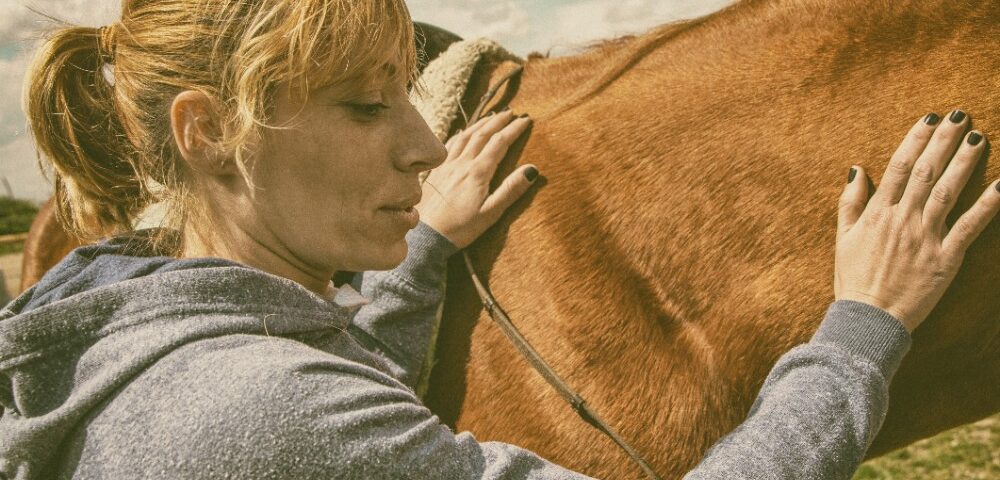
Life After Heroin: 6 Tips To Keeping You On The Right Track
November 10, 2019
Chronic Cocaine Use and Memory Association: What A New Study Reveals
November 16, 2019We are lucky to live in an age where advances in alternative treatment modalities are growing and using animals as a form of therapy, especially in treating those with substance use and mental health disorders, is more popular than ever before. One specific modality currently being used by addiction treatment centers is Equine-Assisted Therapy or sometimes referred to as Equine Psychotherapy. Often, when a person is in active addiction, they begin to lose self-esteem and start experiencing feelings of dread, fear, and worthlessness. Equine therapy allows these feelings to rise to the surface, and instead of being trapped by negative emotions, they begin to feel a sense of connectedness, confidence, and focus. Additionally, research into the benefits of this experiential treatment modality has found that it can help with reducing anxiety, regulate impulses, and establishing a positive identity.
What Happens During Equine Assisted Therapy?
Horses have a unique ability to pick up on social queues and emotional needs of humans. During equine-assisted therapy, patients interact with horses in a way that targets a client’s physical and emotional concerns as well as behaviors that compromise their health or well-being – such as addiction. Horses are gentle creatures, but they can also be intimidating to some individuals, so calming activities such as grooming, feeding, and other repetitive interactions with the animals are typically more of a focus for most sessions. These horses are specially trained therapy animals – they are calm and receptive so that each person in treatment is not only safe but more easily able to interact with each animal. As the client bonds with the horse, emotional and physical healing often takes place. This method has been used as an effective treatment plan for those recovering from trauma, developmental disorders, mental health issues and addiction – to name a few.
The Benefits of Equine Therapy
According to the Professional Association of Therapeutic Horsemanship International, “the concept that horses might be helpful or healing to people struggling with mental health issues is based on the idea that horses are extremely sensitive to changes in the human being (as a predatory creature). Due to their sensitivity, horses react and respond to people differently based upon the person’s emotional state.”
Working with a horse serves as a kind of barometer, providing the client and the therapist with information regarding the client’s moods and changes within those moods. If a person arrives at the session anxious, the horse will act and respond accordingly. If the client can reduce his or her anxiety, the horse’s behaviors will also change. This action provides learning and skill-building opportunities for both the client and the therapist.
Specific Benefits of Equine Assisted Therapy in Recovery
When working with horses, the process can expose emotions that the client may or may not intentionally realize they are feeling or experiencing, especially when it comes to addiction recovery. This interaction helps the therapist understand specific needs, emotions, and goals he or she needs to focus on with their client during treatment. Some targeted benefits equine therapy can offer to those in recovery are:
- Increasing the feelings of social and emotional support, making clients feel that they can finally rely on other people for help when needed. When a person is in active addiction he or she feels incredibly isolated and often loses the ability to trust others. Working with horses can create a non-judgemental space where the client begins to re-establish a belief in trust and social support.
- Promoting transparency between the client and therapist. Often, when someone begins traditional therapy for substance use or addiction, they are still in a protective mode. Most people with a history of addiction spend a great deal of time covering up the truth, lying, and manipulating others to keep their habit thriving. During equine therapy, the patient’s guard finally comes down, allowing for transparency, which helps the therapist to gain insight into the individual’s true feelings and state of mind.
- Developing a positive outlook and understanding of self-care. The skill-building activities during an equine therapy session increases the client’s self-esteem and feeling of control, but it also develops an individual’s sense of hope, collective insight, and positivity. During moments of grooming or feeding the horse, the client also begin to realize that self-care is essential and hopefully will utilize these lessons in their own lives.
- Increasing physical awareness and setting boundaries. During active addiction, individuals lose their ability to feel both emotionally and physically as abusing substances numbs all aspects of life. During horse therapy, the client begins to feel again and experience more awareness of their physical body. They begin to stand a little taller, as their balance and posture changes while physically interacting with the horse. Additionally, horses have keen instincts and can quickly sense changes around them. This behavior forces clients to realize they must respect certain boundaries when dealing with these sensitive creatures. This lesson translates into how the client needs to re-establish boundaries with others in their own lives, promoting a deeper level of healing.
Co-occurring Disorders and Equine Therapy
Equine-assisted therapy has deep roots as a tool for addressing mental health disorders. This kind of experiential treatment holds excellent potential to be a valuable tool in dealing with co-occurring disorders. As an individual works through their substance use disorder or addiction, they also need to address any co-occurring mental health disorders to increase their chance at complete recovery. Equine therapy will allow you to address these mental health concerns alongside your substance use disorder or addiction in order to successfully reach sobriety.
At The Kimberly Center, we know that recovery is a lifelong process of growth and self-discovery and encourage alternative modalities when treating addiction. We offer a variety of treatment services for our clients to choose from, including an equine-assisted therapy program. When it comes to treating co-occurring disorders, it’s most important to help the individual find ways to deal with mental health issues without relying on substances. At The Kimberly Center, we teach holistic methods of addiction and mental health management. If you or your loved one is struggling with addiction, and has either been diagnosed with depression or anxiety or is exhibiting symptoms, please reach out to us today. Our recovery center welcomes anyone who is ready to begin their healing journey. Contact us at 855-452-3683 to learn more about our programs.




